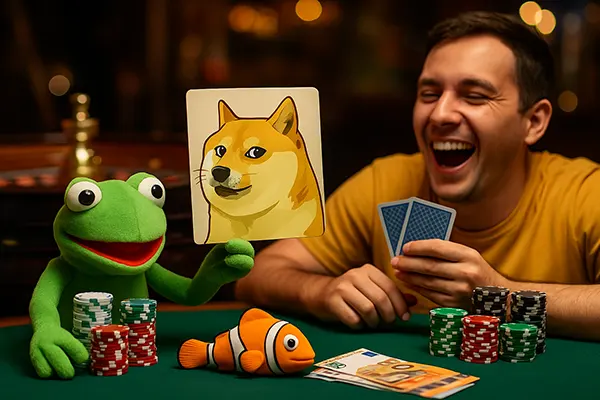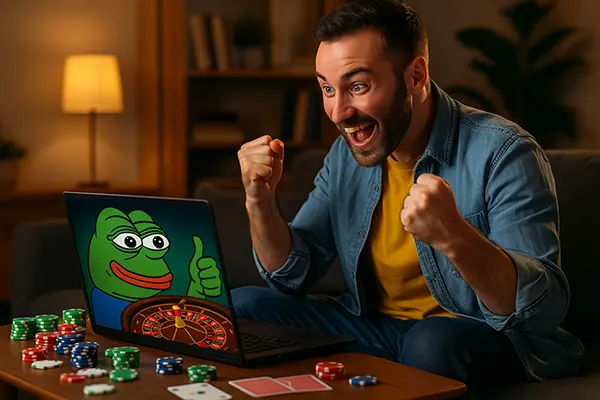How Memes Influence Gambling Decisions: The Phenomenon of ‘Joking Luck’

Memes have long been a form of internet humour, but their influence extends far beyond harmless entertainment. In recent years, gamblers have increasingly turned to memes as not only sources of amusement but also as symbolic guides for making real decisions. This bizarre intersection of humour and high-risk behaviour is what has given rise to the concept of ‘joking luck’ — where players act on superstition, irony, or shared online jokes. But can a meme truly affect someone’s decision to place a bet?
The Rise of Memes in Gambling Culture
Digital communities have a strong influence on behavioural trends, and gambling is no exception. On platforms like Reddit, 4chan, and various Telegram channels, memes about “lucky socks,” “cursed emojis,” or the infamous “just one more spin” catchphrases spread quickly. These memes often evolve into shared rituals, with players mimicking behaviours for “fun” or “because it worked for someone else.”
Memes also normalise irrational decision-making. When users repeatedly see content that jokes about doubling down after a loss or letting a cat choose lottery numbers, they become desensitised to the absurdity. What starts as humour can quietly shape risk perception.
Moreover, the community validation effect means that when people post about wins based on meme-driven methods, others perceive it as proof that the method holds some merit. The meme ceases to be a joke and becomes a pseudo-strategy — albeit with no statistical value.
Examples from Real Forums
On r/sportsbook and r/gambling, one can find dozens of posts where users say they “trusted the Shiba Inu again and it paid off” or “bet on 17 because of that meme.” A popular thread from early 2025 tells the story of a bettor who placed €500 on roulette number 13 after watching a viral TikTok joking about it being “the true number of luck in reverse.” It hit. The post got thousands of upvotes and hundreds of copycats.
Another well-known story on 2+2 Poker Forum detailed a user who let a “Wheel of Fortune” meme generator pick his bets for a week. Surprisingly, he broke even — enough to convince others to try the same approach. These anecdotes often go viral not because they’re smart, but because they entertain — yet the gambling behaviour they promote is real and risky.
Even humourous memes about loss — like “at least my cat still loves me after that parlay” — subtly reinforce behaviour through relatability and normalisation. They turn serious monetary decisions into communal inside jokes.
Psychological Roots Behind ‘Joking Luck’
The phenomenon of ‘joking luck’ taps into a broader field of behavioural psychology. At its core is the gambler’s fallacy — the belief that past events can influence future outcomes. When framed within a joke or meme, the fallacy becomes less threatening, making it easier to act upon.
This behaviour is also a coping mechanism. Humour acts as a buffer for disappointment. By attributing outcomes to a meme or joke, gamblers protect their ego and preserve the illusion of control without feeling fully responsible for the outcome.
It also reflects a known psychological bias called the “illusory pattern perception.” Humans are wired to find patterns, even in randomness. Memes provide a playful template for pattern-seeking, allowing players to feel like they’re using a ‘system’, even if that system is a cartoon frog or a viral joke about clowns.
Humour as a Psychological Shield
Using jokes and memes helps gamblers distance themselves from the seriousness of potential financial losses. When something goes wrong, they can attribute it to the joke — “I did it for the meme.” This not only reduces personal guilt but also removes the sting of social judgement.
On Reddit, users often preface losses with lines like “well, Pepe told me to,” or “it’s the banana’s fault.” These statements serve as subtle disclaimers, psychologically buffering their reputation within the community. Humour becomes both an excuse and an armour.
Importantly, this self-deprecation can turn compulsive behaviour into entertainment — a dangerous shift that blurs the lines between comedy and compulsion. While not everyone takes these jokes seriously, their repeated use normalises irrational behaviour under the veil of playfulness.

The Influence of Social Proof in Meme-Driven Bets
One of the most powerful forces behind meme-based decisions is social proof. Seeing others win — or even joke about winning — using memes as their guide, reinforces the behaviour. It’s a form of digital peer pressure, albeit masked as humour and irony.
Social media algorithms also amplify this. Content that is humorous and unexpected gets more visibility, meaning that successful meme-based bets are seen far more than failed ones. This creates a skewed perception: it appears that these tactics work more often than they truly do.
There’s also the influence of influencers themselves. Some gambling streamers now deliberately incorporate meme elements into their streams — from choosing bet types based on memes to using running gags like “the lucky hat.” These symbols become part of their brand, indirectly suggesting that such rituals bring success.
Are Meme Strategies Here to Stay?
Given how embedded memes have become in online culture, their influence in gambling circles is unlikely to fade. What started as jokes have developed into social phenomena that affect real-world decision-making. While most memes are harmless, their use as decision tools in gambling raises ethical concerns.
For researchers, this intersection of humour, behaviour, and risk is fertile ground. More studies are needed to understand whether meme-based betting reflects impulsivity, escapism, or genuine belief in luck. What’s clear is that the lines between laughter and loss have never been so thin.
Ultimately, memes have become more than cultural content. In the context of gambling, they are behaviour triggers, belief reinforcers, and even justification tools. Whether used in jest or not, their role in shaping decisions should not be underestimated.
